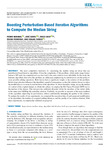Boosting Perturbation-Based Iterative Algorithms to Compute the Median String

Use this link to cite
http://hdl.handle.net/2183/30450Collections
- Investigación (FIC) [1679]
Metadata
Show full item recordTitle
Boosting Perturbation-Based Iterative Algorithms to Compute the Median StringDate
2021Citation
P. Mirabal, J. Abreu, D. Seco, Ó. Pedreira and E. Chávez, "Boosting Perturbation-Based Iterative Algorithms to Compute the Median String," in IEEE Access, vol. 9, pp. 169299-169308, 2021, doi: 10.1109/ACCESS.2021.3137767
Abstract
[Abstract] The most competitive heuristics for calculating the median string are those that use perturbation-based iterative algorithms. Given the complexity of this problem, which under many formulations is NP-hard, the computational cost involved in the exact solution is not affordable. In this work, the heuristic algorithms that solve this problem are addressed, emphasizing its initialization and the policy to order possible editing operations. Both factors have a significant weight in the solution of this problem. Initial string selection influences the algorithm’s speed of convergence, as does the criterion chosen to select the modification to be made in each iteration of the algorithm. To obtain the initial string, we use the median of a subset of the original dataset; to obtain this subset, we employ the Half Space Proximal (HSP) test to the median of the dataset. This test provides sufficient diversity within the members of the subset while at the same time fulfilling the centrality criterion. Similarly, we provide an analysis of the stop condition of the algorithm, improving its performance without substantially damaging the quality of the solution. To analyze the results of our experiments, we computed the execution time of each proposed modification of the algorithms, the number of computed editing distances, and the quality of the solution obtained. With these experiments, we empirically validated our proposal.
Keywords
Approximate median string
Algorithm initialization
Half space proximal neighbors
Algorithm initialization
Half space proximal neighbors
Editor version
Rights
Atribución 4.0 Internacional
ISSN
2169-3536






